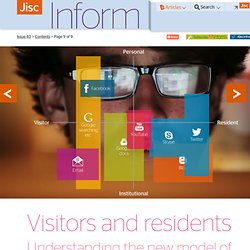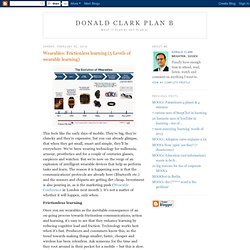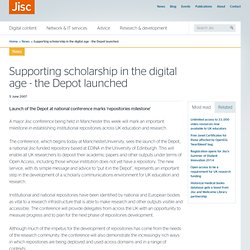

Here comes the SAMR.
MOOC's. Jisc Inform / Issue 40, Summer 2014. Visitors and residents is a new model for understanding online behaviour.

It’s does away with the old, rigid notion that if you grew up with digital technology you’re a ‘native’ who needs no support to learn to work effectively in an online environment and that if you’re a bit older, you are an ‘immigrant’ who’ll never fully ‘get it’. That idea doesn’t serve either group very well. And age is often not a relevant factor in online engagement. The new model is different.
It recognises that individual users can – and do – behave as a visitor, a resident and often as some blend of the two. This resident behaviour, and the evidence it leaves behind, gives us lots of clues about things we don’t know much about. Shining a light on that will enable institutions to engage staff and students better and to produce more effective resources. Distance learning: Wherever you go, you can take your studies with you - Student Life - Student.
Now students don’t have to stay up late or rise at dawn to listen to broadcasts – they can access online lectures and course material 24/7 via the internet. There are people in war zones dodging bombs as they study for MBA degrees, factory workers in Taiwan learning accountancy through British colleges and prisoners taking bookkeeping courses. Distance learning in the UK is often equated with the Open University, brainchild of Harold Wilson, the former Labour prime minister who wanted to bring elitist higher education to working people. When the first students enrolled in January 1971 the OU struggled, sneered at by the lofty redbrick universities that had once suffered the same treatment from the hands of the ancient stone institutions. But by the early 1980s, distance learning had come into its own, so much so that the OU hit the tabloid headlines over allegations of sex romps at its residential weekends. Nowadays, distance learning is not confined to higher education.
The next generation of study. Wearables: Frictionless learning (5 Levels of wearable learning) This feels like the early days of mobile.

They’re big, they’re cluncky and they’re expensive, but you can already glimpse, that when they get small, smart and simple, they’ll be everywhere. We’ve been wearing technology for millennia; armour, prosthetics and for a couple of centuries glasses, earpieces and watches. But we’re now on the verge of an explosion of intelligent wearable devices that help us perform tasks and learn. The reason it is happening now is that the communications' protocols are already here (Bluetooth etc.) and the sensors and chipsets are getting dirt cheap. Investment is also pouring in, as is the marketing push (Wearable Conference in London next month ). Frictionless learning Once you see wearables as the inevitable consequence of an on-going process towards frictionless communications, action and learning, it’s easy to see that they enhance learning by reducing cognitive load and friction.
Intention to action. Mobile learning and personal metrics. Supporting scholarship in the digital age - the Depot launched. Launch of the Depot at national conference marks ‘repositories milestone’ A major Jisc conference being held in Manchester this week will mark an important milestone in establishing institutional repositories across UK education and research.

The conference, which begins today at ManchesterUniversity, sees the launch of the Depot, a national Jisc-funded repository based at EDINA in the University of Edinburgh. This will enable all UK researchers to deposit their academic papers and other outputs under terms of Open Access, including those whose institution does not yet have a repository.
The new service, with its simple message and advice to “put it in the Depot”, represents an important step in the development of a scholarly communications environment for UK education and research. Institutional and national repositories have been identified by national and European bodies as vital to a research infrastructure that is able to make research and other outputs visible and accessible.